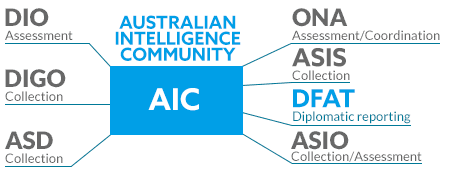Time for an intelligence ‘consultation board’?
Posted By Siobhan Clifford on March 28, 2018 @ 11:07

Last year’s national security reforms emphasised the need for greater coordination in national intelligence and domestic security affairs. Given that priority, it’s easy to forget that the 2017 Independent Intelligence Review [1] made a striking recommendation to enhance contestability within the intelligence assessment process—which leads to an interesting conundrum for the future operating model.
The review recommended establishing a ‘consultation board’ [2] that would incorporate public and private sector input in defining intelligence priorities and making assessments. That would create another avenue for dissent and would ultimately influence the assessment process.
This represents an important counterbalance to the separate recommendation that the Office of National Intelligence (ONI) become the principal advisor to the prime minister on matters relating to the national intelligence community. No doubt, the recommendation to create a consultation board was made in anticipation that an ONI with boosted resources and greater power over the Australian intelligence community (AIC) could risk dominating the discourse [3].
There are other considerations. The Snowden [4] fallout [5] showed the importance of accountability and transparency in the oversight of intelligence agencies. Other factors also highlight gaps in our preparedness for emerging risks and threats (such as how to deal with mass cybersecurity breaches [6]).
Bringing expert minds together makes sense considering the incredibly complex security challenges we expect to face in the years ahead. That requires—more than ever—seeking varied expertise and subjecting intelligence assessments to even more rigorous examination.
On the other hand, the prime minister argued [7] that reshaping the AIC served the need for ‘more decisive action’, signalling that protracted internal debate might be a weakness. It’s a valid concern, but a consultation board wouldn’t stop at merely presenting dissenting views. Instead, it would facilitate dialogue on how and where assessments differed, providing decision-makers greater insight into conclusions, methodologies and assumptions. Such robust advice should underpin better-informed decision-making if it could be provided in a timely manner.
When he released the unclassified version of the review, the prime minister hadn’t formally accepted its recommendations. Most had been referred to a taskforce. Here are three things the government should be thinking about before deciding where to land.
First, contestability in intelligence isn’t new. Back in 2004, the Flood review [8] noted that contestability had been increasing, which was a positive development and tended to deepen the quality of intelligence assessments. Flood recommended that peer-review arrangements be adopted between and within intelligence agencies to optimise the informal quality assurance measures.
The latest review goes a step further, calling for academics, think tanks and the private sector to have a say. It’s striking that the Flood review made much of the private sector competing with intelligence agencies. Perhaps the new recommendation signals a shift from viewing the private sector as a rival to considering it as a partner.
Second, the review’s suggested approach seems to set Australia apart from the rest of our Five Eyes allies. The US, UK, Canada and New Zealand all have contestability practices in place. These are primarily peer-review mechanisms (such as the UK’s Joint Intelligence Committee of Cabinet) or offer the private sector consultative roles in discrete areas of national security (examples include the respective cybersecurity centres in the United States [9], United Kingdom [10] and New Zealand [11]). Interestingly, only Australia seems to be considering bringing outside perspectives into the heart of national intelligence policymaking.
Most of all, it’s complicated. To make the idea workable means giving outsiders access to classified and sensitive information. But widening access to intelligence increases the risk of leaks (unintentional or otherwise). The corresponding effect on agencies’ risk appetites would need to be considered.
Naturally, members of the consultation board wouldn’t be entitled to unlimited access. And they’d be strictly warned against using board material for any other purposes. In theory, the board should be given the minimum information necessary to make its deliberations effective. A balance between facilitating informed debate and the ‘need to know’ needs to be struck.
And if the price of participation is so high, will the private sector be willing to engage? It might depend on the perceived value of having influence in this space.
Getting the right people cleared to the appropriate level is another consideration. Many individuals already have clearances. But getting the right mix of people would probably require a carefully considered enterprise approach. Then those individuals would need to undergo a lengthy and intrusive clearance process, and then maintain that clearance.
This one recommendation generates plenty for government to think about. A consultation board could enhance the oversight and robustness of intelligence assessment, bringing in analytical diversity to inform complex decisions. Conversely, it might place unintended burdens on agencies and individuals alike.
On the whole, the concept of a consultation board seems to be a positive opportunity for the AIC and for government, if the attendant challenges can be managed.
Article printed from The Strategist: https://aspistrategist.ru
URL to article: /time-intelligence-consultation-board/
URLs in this post:
[1] 2017 Independent Intelligence Review: https://www.pmc.gov.au/national-security/2017-independent-intelligence-review
[2] recommended establishing a ‘consultation board’: https://www.pmc.gov.au/resource-centre/national-security/report-2017-independent-intelligence-review
[3] dominating the discourse: /oz-intelligence-review-new-czar/
[4] Snowden: /edward-snowden-the-media-and-the-pulitzer/
[5] fallout: http://foreignpolicy.com/2014/07/11/the-snowden-aftermath-revised/
[6] how to deal with mass cybersecurity breaches: http://www.canberratimes.com.au/national/public-service/data-breach-sees-records-of-50000-australian-workers-exposed-20171102-gzdef3.html
[7] argued: https://www.pm.gov.au/media/strong-and-secure-australia
[8] Flood review: https://fas.org/irp/world/australia/flood.pdf
[9] United States: https://www.dhs.gov/organization/pso-private-sector-office
[10] United Kingdom: https://www.gchq.gov.uk/how-we-work
[11] New Zealand: https://dpmc.govt.nz/publications/new-zealands-cyber-security-strategy
Click here to print.